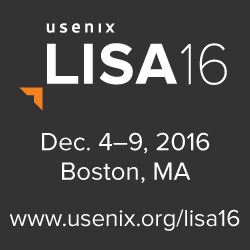Getting Started with Puppet
Thomas Uphill, Wells Fargo
Thomas Uphill, Wells Fargo

Thomas is a Red Hat certified architect with nearly 20 years of system administration experience. He has spoken at LISA, LOPSA, PICC, Cascadia, and PuppetConf. He has been working with Puppet for several years and recently wrote the Third Edition of the Puppet Cookbook. Thomas previously wrote Mastering Puppet, a book on deploying Puppet in large environments. He is a board member of LOPSA and the vice-president of SASAG, the Seattle chapter of LOPSA. When he isn't working on LOPSA or SASAG he can be found hosting the Puppet User Group Meetup in Seattle (PUGS).

author = {Thomas Uphill},
title = {Getting Started with Puppet},
year = {2015},
address = {Washington, D.C.},
publisher = {USENIX Association},
month = nov
}
This tutorial will start with the basics of Puppet, how Puppet defines a system. We will cover the language syntax and how to create manifests. We will delve into how code is organized into classes and modules. We will then use modules to define nodes through an abstraction known as roles and profiles. We will briefly introduce all the tools available to the puppet developer. We will introduce the Puppet Forge. This will be a fast paced introduction to all that Puppet has to offer.
Note: When I've done this in the past I've used live USB keys for attendees. I have also done Vagrant boxes for this and may opt to do that again. Either one will be about 4GB in size and I will bring some USB drives with the images on them.
Anyone who is thinking about using Puppet or is just starting out and looking for a solid introduction.
How all the parts of the Puppet ecosystem work. How to write manifests and some best practices for implementing Puppet in their shop.
- Resource Abstraction Layer (RAL)
- Types and providers
- Puppet language
- Classes/modules
- Roles and profiles
- Tools
- Facter
- Hiera
- PuppetDB
- Geppetto
- Virtual resources/external resources
































connect with us